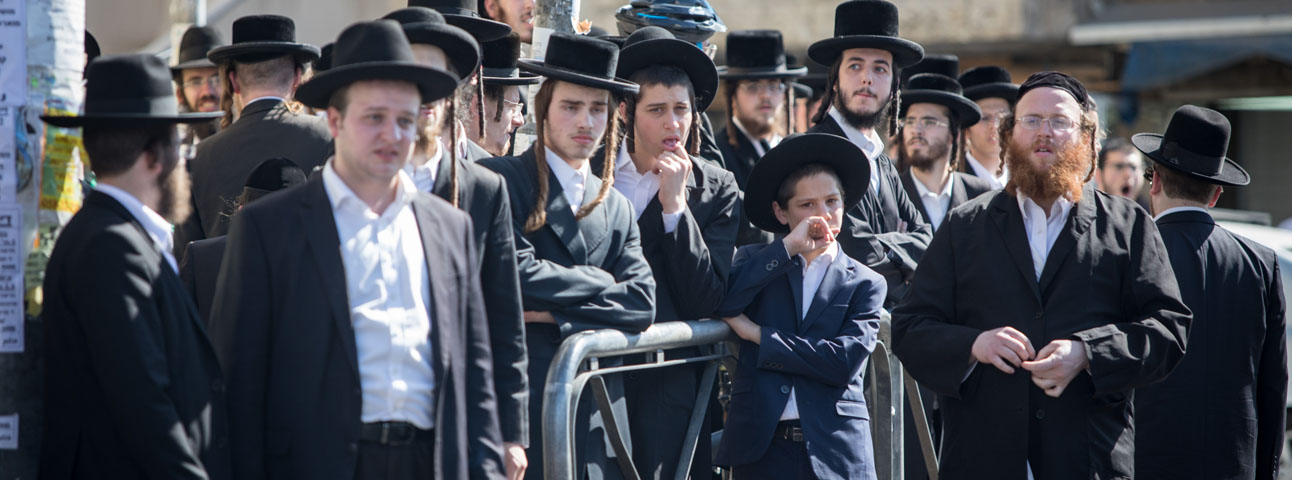Ultra-Orthodox Non-Compliance Rests on Fear
In the second wave of the pandemic it seems that many ultra-Orthodox rabbis are assigning higher priority to 'customer retention' than to the clear halakhic imperative to preserve health and life

Flash 90
The ultra-Orthodox “revolt” of the last lockdown, which continues until today, is most clearly expressed in the opening of their elementary schools for boys.
This violation of the rules brings to light two phenomena: the first is the unmistakable priority granted to abiding by communal and religious values over complying with the laws of the state. Second, and just as strong, is fear. The behavior of the ultra-Orthodox, as some of their leaders candidly acknowledge, stems from the recognition that if they leave their flock without supervision, even briefly, the whole system is liable to fall apart. This insight, which shows ultra-Orthodox society in a sad light, reveals that it is clearly in need of internal soul-searching. But it also sprouts hope for the integration of the ultra-Orthodox into Israeli society in the future.
The conduct of the ultra-Orthodox since the onset of the pandemic, and all the more so during the recent lockdown, has left many Israelis rubbing their eyes in disbelief. Besides the anger at the irresponsibility and flagrant lack of solidarity displayed by most of the ultra-Orthodox, many outside the community simply cannot understand why its rabbis and leaders, who certainly do not want their followers to fall sick or die, are knowingly endangering their health. Indeed, the morbidity and mortality figures among the ultra-Orthodox have skyrocketed, to the point where this sector has become a world leader in coronavirus infections.
One possible explanation — admittedly, rather shaky — is that Jewish values oblige us to continue public prayer and Torah study in a public setting, whatever the health risk. This is a dubious explanation, since one need not be a great talmudic scholar or an eminent halakhic adjudicator to understand that, in Judaism, the supreme value, overriding all else, is the sanctity of life. This is expressed in the halakhic dictum that the precepts (mitzvot) were given to live by (meaning that individuals must live in order to fulfill them), rather than to die for (as a result of keeping them). This principle is the beacon that lights the path of each and every Jew.
The second explanation, less obvious but more convincing, is fear. There are two ways to enforce an ascetic lifestyle that demands personal sacrifice, of the sort followed by the ultra-Orthodox. One is an ardent belief, shared by all members of the community, that theirs is the right path; the other is by building up high walls to insulate the community and — enforce a draconian regime within them. The COVID-19 pandemic makes it glaringly clear that the ultra-Orthodox community’s existence and sustainability is grounded in rigid and uncompromising regimentation, as well as in fear.
Ultra-Orthodox life revolves around a close-knit community framework that defines the parameters of its members’ lives and their choices, from the cradle to the grave. Prayers, group study, the rabbis’ gatherings and receptions for their followers, and all the other community events guarantee that individuals will be under close supervision at almost every moment of their lives. The rabbi, the teacher, the spiritual supervisor in the yeshiva, the man in the next pew in the synagogue, the neighbors in the park — all of them are always watching, keeping their eyes on everyone else, making sure that they toe the line, and do not deviate in the slightest bit from the straight and narrow path. Every wig that does not keep a married woman’s hair wholly out of sight; every failure to show up for daily services, is cause for concern. Any seriously deviant behavior constitutes the grounds for harsh community sanctions, ranging from exclusion from the synagogue to condemnation and ostracism of the “criminal” and his family. For those born into this communal reality, this is a punishment too cruel to bear.
And then came the coronavirus pandemic. To comply with the rules of social distancing imposed by the government, the ultra-Orthodox, like all other Israelis, have to stay home and manage without key elements of their community life. Yes, you can pray with a minyan of only 10 men in the courtyard of your apartment building. Yes, you can study Talmud at home. But when men of all ages are at a distance from the community circle, its watchful eye no longer has them in constant view. Confined at home, without the rabbi or neighbor to keep tabs on them, they are liable to go downhill, discover that there are other ways to live, and to find their way out of the community.
This truth, which most rabbis have preferred to keep under wraps, was revealed by several among them who openly acknowledged that their followers are too weak to stay within the fold without close supervision. Their calculation was simple. There is no doubt that the pandemic endangers life; but the threat of dropout from the community and of spiritual damage that cannot be remedied is far greater and far more terrifying. Such a threat may shake the foundations, the regime, the community. The rabbis are assigning higher priority to “customer retention” than to the clear halakhic imperative to preserve health and life.
This fear, which lies behind the willingness of many ultra-Orthodox rabbis to sacrifice their followers’ lives — and those of other Israelis — is clear evidence of their doubt as to their followers’ commitment to the path, and of their sense that without close supervision and high walls, everything could fall apart. From a broader Israeli perspective, if this is indeed the true picture, perhaps there is hope for the future. Perhaps the broader and deeper integration of the ultra-Orthodox into Israeli society is not impossible after all.
The article was published in the Times of Israel.
